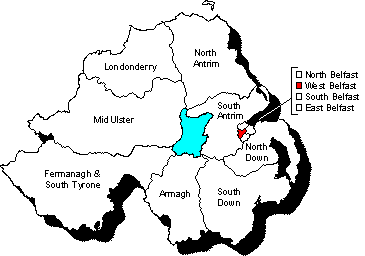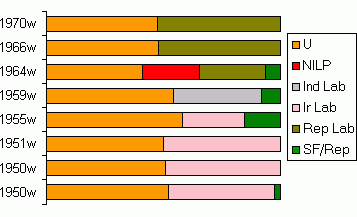

 |

|
|
|
|
|

|

|
| Map and diagram by Conal Kelly | |
Established in 1920, this constituency incorporates the western quarter of the city of Belfast. Between 1950 and 1970 the constituency was represented by six different MPs (4 Unionist, 1 Irish Labour, 1 Republican Labour). All elections held during this period were contested.
See also election results for West Belfast 1973-1982, 1983-1992 and 1993-2007.
| U | NILP | Ind Lab | Ir Lab | Rep Lab | SF/Rep | |
| 1970w | 47.2% | 52.8% | ||||
| 1966w | 48.0% | 52.0% | ||||
| 1964w | 41.2% | 24.2% | 28.3% | 6.3% | ||
| 1959w | 54.1% | 37.6% | 8.3% | |||
| 1955w | 58.3% | 27.3% | 14.4% | |||
| 1951w | 50.0% | 50.0% | ||||
| 1950w-b | 50.7% | 49.3% | ||||
| 1950w | 51.4% | 46.3% | 2.2% |
Republican Labour majority: 3,198; electorate: 68,665; votes cast: 84.6%
The incumbent Fitt
was defending his seat for the first time in 1970. As was the case four
years earlier, his sole opposition came from the Unionist Party. Kilfedder,
who had lost the seat to Fitt in 1966, was now contesting North Down, so the
Unionists opted for a new candidate in Brian McRoberts. In an intense campaign,
McRoberts faced an uphill battle against the high-profile Fitt. On polling day
McRoberts' election headquarters on the Shankill Road were bombed (no injuries).
In one of the closest results of the election, Fitt was returned to Westminster
with an increased majority of 3,198.
Fitt would continue to represent West Belfast until 1983, for the the
Social Democratic and Labour Party (SDLP), the party he helped found in
1970 and led until 1980, and then as an Independent Socialist. In July
1983, after his defeat by Gerry Adams of Sinn Fein, he was made a UK
life peer as Baron Fitt, of Bell's Hill
in the County of Down. McRoberts had previously stood unsuccessfully
for the Northern Ireland House of Commons in the 1962 general election
for the constituency of South Armagh.
Republican Labour majority: 2,011; electorate: 67,575; votes cast: 74.8%
The 1966 election
in West Belfast saw the incumbent Kilfedder defending his seat for the
first time. In a two-horse race, Kilfedder faced Gerry Fitt of the
Republican Labour Party. Fitt, the colourful, fast-talking, ex-sailor,
had represented Belfast Dock in the Northern Ireland House of Commons since
1962. In the closest result of the election, Kilfedder managed to increase
his vote over his 1964 tally but he was unable to out-poll Fitt who was
elected to Westminster with a majority of just over 2,000.
Along with his fellow Belfast councillor Harry Diamond, Fitt was a founding member of the
Republican Labour Party. Fitt had unsuccessfully contested Belfast Dock in
the 1958 general election before his successful run in 1962. He was also a member of Belfast City Council
between 1958 and 1981. In the 1970 general election Kilfedder was elected
to represent North Down. He held this seat until his
death in 1995. Initially a member of the Unionist Party, he later left and
formed the Ulster Popular Unionist Party.
Unionist majority: 6,659; electorate: 69,399; votes cast: 74.7%
The incumbent
McLaughlin was not selected to contest the 1964 general election, instead
the Unionists chose London based barrister James Kilfedder as their
candidate. Kilfedder was joined in the contest by three other candidates.
Principle among these was veteran Belfast socialist Harry Diamond. Diamond,
who represented Belfast Falls in the Northern Ireland House of Commons, had
recently founded the Republican Labour Party along with his fellow belfast councillor Gerry
Fitt (wags commented at the time that two one-man parties had combined to become one two-man party). Diamond was not the only socialist on the ballot. Billy Boyd, who
represented the Belfast Woodvale constituency at Stormont, was the NILP's
chosen candidate. Rounding out the field was former IRA prisoner Billy
(Liam) McMillan, who was standing as a Republican (Sinn Fein now being a
proscribed organization).
The most interesting incident of the election involved an aspiring
political activist by the name of Ian Paisley, who threatened to lead his
supporters to remove a tricolour on display at Republican headquarters on
Divis Street, if the authorities failed to act first. The RUC moved in and
removed the flag and clashed with local residents. Several days later, when
the flag was replaced, the RUC once again returned to remove it, this time
however their actions triggered some of the most intense rioting the city
had seen since 1935 and gained widespread media attention.
The contest was ultimately won by the Unionist Party candidate, James
Kilfedder, who gave much credit to the Rev Paisley, without whom, he said,
his victory would not have been possible. His margin of victory was in
excess of 6,000 votes, however the Unionist vote had decreased significantly
when compared with 1955 and 1959.
Diamond would later lose his Belfast Falls seat to Paddy Devlin of the NILP
in the 1969 Northern Ireland general election. Billy Boyd lost his Belfast
Woodvale seat in 1965 and was unable to regain it in the 1969 election. He
also stood unsuccessfully in West Belfast for the 1973 Assembly and in North
Belfast for the 1975 Constitutional Convention and the 1982 Assembly election
(as an Independent). He also contested West Belfast in the Westminster
elections of February 1974. After the Provisional republican split
in 1969, Liam McMillan became a leader in the ‘Official’ Republican Movement.
He was later assassinated by the INLA during a feud in 1975.
Unionist majority: 8,836; electorate: 73,405; votes cast: 72.7%
Seeking a second
term, the incumbent McLaughlin again represented the Unionist Party in
West Belfast in 1959. Her principle opposition came from Independent Labour
candidate John Brennan, who was hoping to attract the supporters of the
retired Jack Beattie. The result was another victory for McLaughlin,
although her majority was cut to just over 8,000 votes. Brennan managed
to improve on Beattie's 1955 tally and captured over 37% of the poll. The
third place finisher, Sinn Fein's Thomas Heenan, saw his party's support
almost halved compared to 1955. This was due largely to the IRA's on-going
and divisive Operation Harvest campaign.
McLaughlin was not selected to contest the 1964 general election, but
she later stood unsuccessfully as the Conservative Party candidate for
Wandsworth Central (in south London) in the 1970 general election, losing by less than 3,000 votes.
Brennan stood unsuccessfully in the Belfast Falls constituency for the
Northern Ireland House of Commons in the 1962 general election. A founding
member of the National Democratic Party, he was subsequently elected to
Stormont in the 1965 general election for Belfast Central.
Unionist majority: 18,141; electorate: 78,559; votes cast: 74.7%
The incumbent Beattie
was again running under the Irish Labour banner in 1955. Following the
untimely death of their previous candidate, Thomas Teevan, in 1954, the
Unionists selected Patricia McLaughlin as their standard bearer. McLaughlin
was not only the sole female Unionist candidate, she was the only female
candidate across all Northern Ireland.
This election also came at a time of increased militant republican activity.
In October 1954 the IRA had attempted a raid on Omagh Barracks in order to
capture weapons for their planned Operation Harvest. The raid was a failure
and led to the capture of eight IRA members. One of those captured and
imprisoned for his part in the raid was Eamonn Boyce. Boyce was subsequently
selected to represent Sinn Fein in West Belfast.
When the votes were counted, Beattie's support appeared to have evaporated;
he polled less than half his 1951 tally. Some of his support had made its way
to Sinn Fein who captured just above 14% of the poll. However, the story of
the election was the victory of McLaughlin who was elected to Westminster
with a comfortable majority in excess of 18,000.
Beattie had stood unsuccessfully in the Belfast Central constituency for
the Northern Ireland House of Commons in the 1953 general election. McLaughlin
was not the first female Unionist MP, that mantle was achieved by Patricia
Ford who succeeded her father in the North Down by-election of 1953. However
McLaughlin was the first female
Unionist MP endorsed directly by the electorate (Ford had been elected unopposed).
Irish Labour majority: 25; electorate: 78,828; votes cast: 84.1%
Having served in the House of Commons for just under a year, Teevan found himself returning to the hustings to defend his seat in the 1951 general election. He faced the same opponent he had so narrowly beaten the year before, Irish Labour Party candidate Jack Beattie. In the closest result of the election, Beattie managed to recapture the seat he lost 20 months earlier by a mere 25 votes.
Despite his young age, Teevan was widely seen as a rising star and a potential future leader of Unionism. Unfortunately he died very suddenly, aged 27, in 1954.
Unionist majority: 913 electorate 78,459; votes cast: 79.9%
Having been elected in the February general election, Rev. MacManaway became the first priest to take his seat in the House of Commons for 150 years. His priestly status raised some questions and the matter was referred to the Judicial Committee of the Privy Council. The judgment of the Committee was that MacManaway was ineligible to serve in the House of Commons and a new writ was issued. The resulting by-election was held 29 November, just nine months after the previous contest. The Unionists selected 23 year old lawyer Thomas Teevan as their candidate, while Jack Beattie once again contested the constituency under the Irish Labour Party banner. In a hotly contested election, Teevan managed to squeak home with a majority of just 913 votes, the youngest MP of the day.
Unionist majority: 3,378; electorate: 78,896; votes cast: 83.6%
Irish Labour
candidate Jack Beattie had represented the constituency of West Belfast
since the 1943 by-election. Defending his seat for the second time, Beattie's
principle opponent was Unionist candidate and Church of Ireland cleric,
the Reverend James MacManaway. Also contesting the election was veteran
Belfast republican, Jimmy Steele, who was Sinn Fein's sole candidate in the
1950 general election. The result was a narrow victory for the Unionists, MacManaway
topping the poll with a majority of just under 3,400. Beattie was the only
sitting MP not to be returned in the 1950 general election.
Beattie had been a member of the NILP (and one time leader) until he
was
expelled in 1934. He was readmitted to the party in 1942 before
resigning
again the following year. He formed the Federation of Labour in 1945
before disbanding it and joining the Irish Labour Party in 1949. He
contested the 1943 by-election and the 1945 general election as an
Independent Labour candidate. Beattie had represented East Belfast in
the Northern Ireland House of Commons between 1925-1929 and Pottinger
between 1929-1949. Rev. MacManaway was also a member of the Northern
Ireland House
of Commons, having been elected for the City of Londonderry from 1947
until his resignation in January 1951.
See also:
Results from 1950 to 1970 for each seat: East Belfast | North Belfast | South Belfast | West Belfast | North Antrim | South Antrim | Armagh | North Down | South Down | Fermanagh and South Tyrone | Londonderry | Mid Ulster
Other sites based at ARK: ORB (Online Research Bank) | CAIN (Conflict Archive on the INternet) | Northern Ireland Life and Times Survey
Your comments, please! Send an email to me at nicholas.whyte@gmail.com.
Conal Kelly, 1 June 2007.
|
Disclaimer:©
Nicholas Whyte 1998-2004 Last Updated on Wednesday, 12-Jan-2005 12:12
|